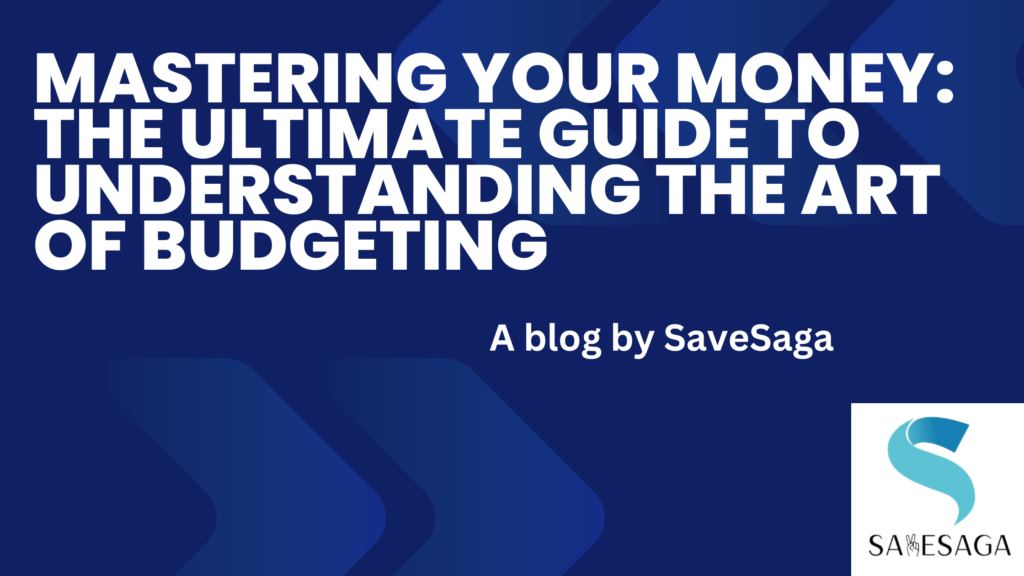Master the art of budgeting for financial success. Our ultimate guide provides actionable tips for effective budgeting. Start your journey today!
Introduction
A life is free of financial worry, where your hard-earned money seamlessly aligns with your hopes and objectives. That isn’t fiction; that is the power of budgeting in action. We’re about to begin a journey that will reveal the actual potential of your money and equip you with the information and skills to control your financial future.
Money is more than just money; it represents your hard work, aspirations, and potential to live the life you want. Budgeting is frequently overlooked and holds the key to unleashing this potential. It’s not about limiting yourself; it’s about intentionally diverting your money to achieve a life of financial stability and plenty.
Table of Contents
What is budgeting
Budgeting is developing a plan for allocating your financial resources, such as income and spending, over a specific period. It entails evaluating your income, classifying your costs, and deciding how much to devote to each. The primary purpose of budgeting is to guarantee that your money is spent sensibly, that you are fulfilling your financial goals, and that you are not overspending.
Budgeting allows you to keep track of your financial activities, control your expenditures, and make educated decisions about how to spend your money. It enables you to prioritize your financial goals, such as saving for a specific reason (for example, an emergency fund, a trip, or a home), paying off debt, or investing for the future.
Five reasons why budgeting is so important

Here are five reasons why budgeting is so important:
- It helps you reach your financial goals. A budget can help you track your spending and ensure you spend wisely in all areas. This can free up money to reach your financial goals, such as saving for a down payment on a house, paying off debt, or retiring early.
- Prevents overspending. When you have a budget, you are more likely to think twice before purchasing. This can help you avoid impulse buys and unnecessary spending.
- Allows you to make informed financial decisions. A budget can help you see where your money is going each month. This information can help you make better financial decisions, such as choosing a cheaper cell phone plan or cutting back on eating out.
- It helps you stay on track. A budget can help you stay on track with your financial goals. If you are going off-path, your budget can help you identify the areas where you need to make changes.
- Reduces stress. When you have a budget, you better understand your financial situation. This can help reduce stress and anxiety about money.
Types of Budgets
The most popular types of budgets are:
Incremental budgeting:
This is the most common type of budgeting. It starts with the previous year’s budget and then makes adjustments for inflation, changes in sales, or other factors. Incremental budgeting is easy to set up and maintain. Still, it can be inefficient because it only sometimes considers changes in the business.
Zero-based budgeting
Zero-based budgeting: This budgeting strategy begins with a blank slate every year. All costs must be justified, even if they were previously budgeted. Zero-based budgeting takes more work but may help you find and remove waste.
Activity-based budgeting
This budgeting style focuses on the activities that generate expenditures. Each action is allocated a cost, which is then added to the budget. Activity-based budgeting is more challenging to set up than other budgeting approaches. Still, it can be more precise in expense allocation.
Value proposition budgeting
The value that each activity or product gives to the client is the emphasis of this budgeting strategy. Each action or development product’s expenses are weighed against the value they provide to decide if they should be retained. Budgeting for value propositions may be a helpful strategy for firms that wish to focus on giving value to their consumers.
Flexible budgeting
This budgeting strategy allows for budget adjustments depending on actual performance. This might be useful for firms that have fluctuating revenues or expenditures. Flexible budgeting may be more challenging to implement than other budgeting systems. Still, it may reflect the business’s financial status more accurately.
The best type of budget for you will depend on your circumstances and needs. If you are new to budgeting, incremental budgeting may be a good option. As you become more experienced, consider other budgeting methods, such as zero-based budgeting or activity-based budgeting.
Here are some additional factors to consider when choosing a budgeting method:
- The size and complexity of your business
- Your financial goals
- Your time and resources
- Your comfort level with complexity
Categorized your spending
Categorizing your spending is the first step to understanding where your money is going. Once you know where your money is going, you can change your spending habits and reach your financial goals. There are many different ways to categorize your spending. Still, some common categories include housing, transportation, food, personal care, clothing, entertainment, healthcare, debt payments, savings, and miscellaneous. The best way to categorize your spending is to choose a system that works for you and your budget.
Tips for Smart Saving

Set clear financial goals
One of the first steps toward intelligent saving is defining clear financial goals. Decide what you’re saving for – whether it’s an emergency fund, buying a house, funding your child’s education, or retirement. Specific goals will give your saving efforts a sense of purpose and motivation.
Create a Realistic Budget
A well-structured budget is required for efficient savings. Track your income and spending to uncover places where you might save money. Set aside a percentage of your salary for deliverance from the beginning to maintain steady success.
Embrace Frugal Living
Frugality does not imply abandoning your quality of life; instead, it means making deliberate decisions to spend on what is essential. Look for ways to save money, such as cooking at home, utilizing public transit, and using discounts and coupons.
Automate Your Saving
Set up automatic transfers from your checking account to your savings account to make saving easier. This eliminates the temptation to squander money that should be preserved while ensuring constant payments.
Prioritize High-Interest Debts
Prioritize paying off high-interest debt, such as credit card amounts, before focusing entirely on saving. The interest on such debt can cancel out your savings gains. Once your debt is under control, you may shift those payments into your savings account.
Practical Budgeting tools

Managing your money might feel like traversing a minefield while blindfolded. However, having the correct tools at your disposal makes the road to financial security much more accessible. In this complete tutorial, we will introduce you to a selection of realistic budgeting tools that will transform how you handle your money. We’ve covered everything from tracking costs to creating savings goals. Let’s get started and see how these tools may help you on your way to financial success.
Mint: Your Financial Companion
For a good reason, Mint is one of the most popular budgeting apps accessible. This simple program lets you connect your bank accounts, credit cards, and investment accounts in one place. Mint’s categorization tool automatically classifies your transactions into several spending categories, giving you a clear picture of where your money is going.
You Need A Budget (YNAB): Assign Every Dollar A Job
True to its name, YNAB focuses on giving every dollar a specific purpose. It encourages users to create a detailed budget plan by assigning each dollar to a particular spending category. YNAB’s proactive approach helps you make informed spending decisions, minimize unnecessary expenses, and prioritize your financial goals. It’s one of the excellent budgeting tools.
Personal Capital: Where Budgeting Meets Investing
Personal Capital combines budgeting with investment tracking, offering a comprehensive financial overview. It allows you to monitor your net worth, track expenses, and even plan for retirement. By linking your investment accounts, you can closely monitor your portfolio’s performance while managing day-to-day finances.
PocketGuard: Your Pocket-Friendly Financial Guardian
PocketGuard takes a unique approach by providing a simplified yet practical budgeting experience. Upon connecting your accounts, the app subtracts your bills, savings goals, and planned expenses from your income, leaving you with a clear “pocket” of available funds. This approach helps you stay within your means and avoid overspending.
Budgeting as a Couple
Steps for effective budgeting as a couple:
- Decide on your financial goals, both individually and as a couple
- Identify your sources of income
- Get all of your personal and joint expenses down
- Decide how you will split your expenses
- Set spending limits and savings expectations
- Fund the budget
- Manage the budget.
FAQs
Conclusion
Mastering the art of budgeting is the key to unlocking financial freedom. It’s not just about tracking expenses; it’s about aligning your money with your dreams. Budgeting helps you reach goals, control spending, make informed choices, and reduce stress. Choose the correct method, categorize spending, and use tools like Mint and YNAB for success. For couples, joint budgeting strengthens bonds. Regular review, smart saving, and strategic decisions accelerate progress. Budgeting isn’t just understanding – it’s mastering your financial future.
Free Invoice Template for Excel: Streamline Your Billing Process
In the fast-paced world of business, efficiency and accuracy in billing are paramount. At SaveSaga,…
20+ Budget-Friendly Gift Ideas for Every Special Occasion
Unlock the secret to heartfelt gifting without breaking the bank. Explore our guide for creative,…
30+ Ways to Make $1000 Fast in 2024: Legal, Legit, and Lucrative
#MAKE MONEY Make $1000 fast Are you struggling to make ends meet? Do you need…
How to Create a Budget as a College Student, 13 best ways
In the whirlwind of college life, Budget as a College Students can be a daunting…
8 Proactive Strategies On How To Protect From Inflation For Financial Stability
Explore proactive budgeting and investment strategies on how to protect from inflation and to maintain…
Decoding Fixed And Variable Expenses: Achieving Financial Stability Through Smart Budgeting
Master the art of financial stability with our guide on budgeting. Explore the balance between…






Pingback: 10 Brilliant Money-Saving Tips: How to Save Money Monthly
Pingback: 20 Budget-Friendly Home Decor Hacks: Transform Your Space on a Dime -
Pingback: Navigating Irregular Income with a Budget: Mastering Financial Freedom -
Pingback: 5 Budget-Friendly Date Night Ideas: Rekindle Romance on a Budget -